Outstanding Life Sciences Innovations presented by LSMU, Kauno Klinikos and LSMU Kaunas Hospital in Vilnius
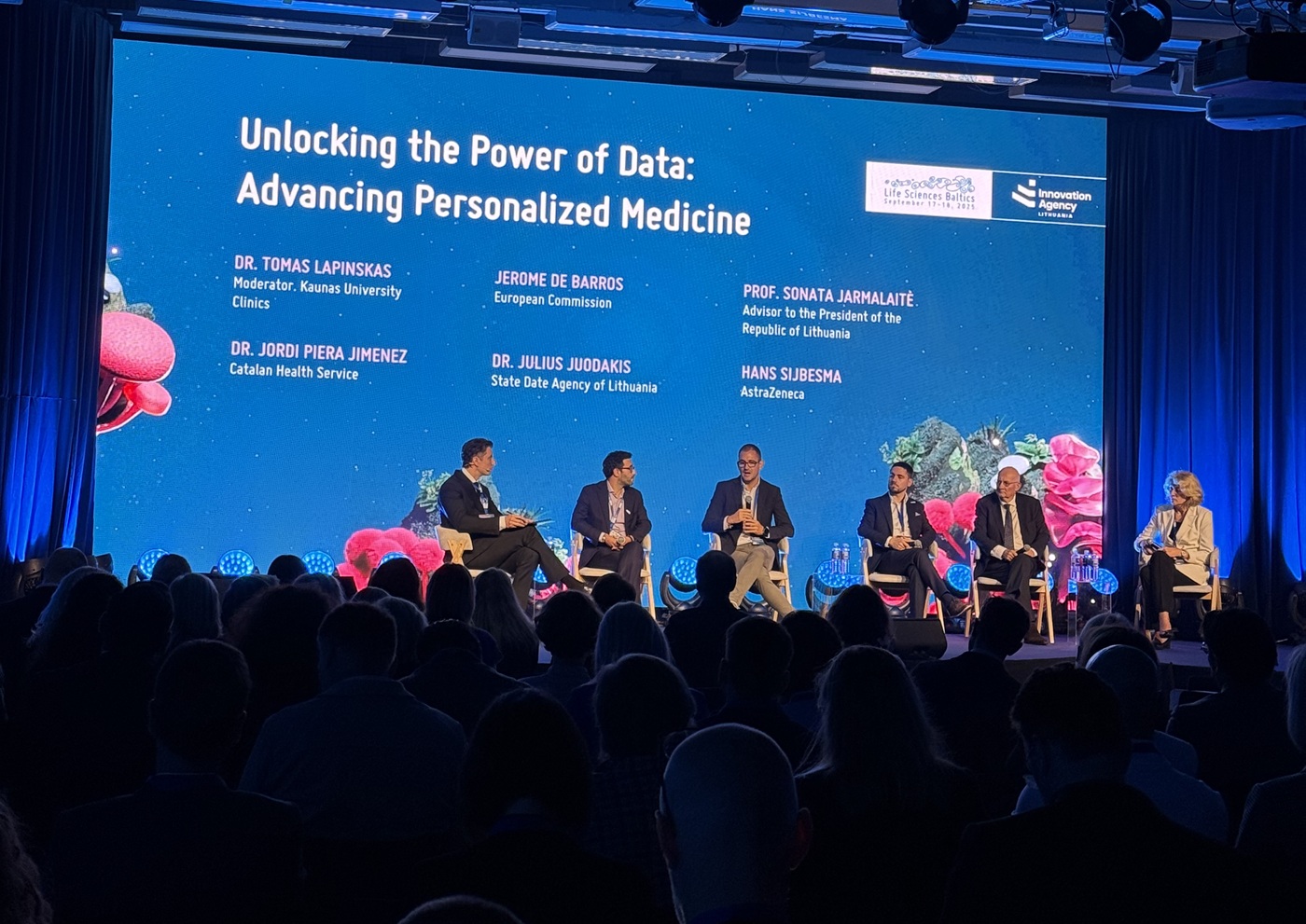
The Life Sciences Baltics 2025 event, held on 17–18 September in Vilnius, was a special occasion for the Lithuanian University of Health Sciences (LSMU) and its university hospitals. At their joint booth and during the forum sessions, an impressively broad spectrum of scientific achievements, innovations, diagnostic and treatment possibilities was presented – some of them unique not only in Lithuania but also internationally.
This year, LSMU’s strategic research directions were showcased at the largest life sciences event in the Baltic region. The University’s research institutes presented their discoveries and opportunities in fields recognised as among the most advanced globally.
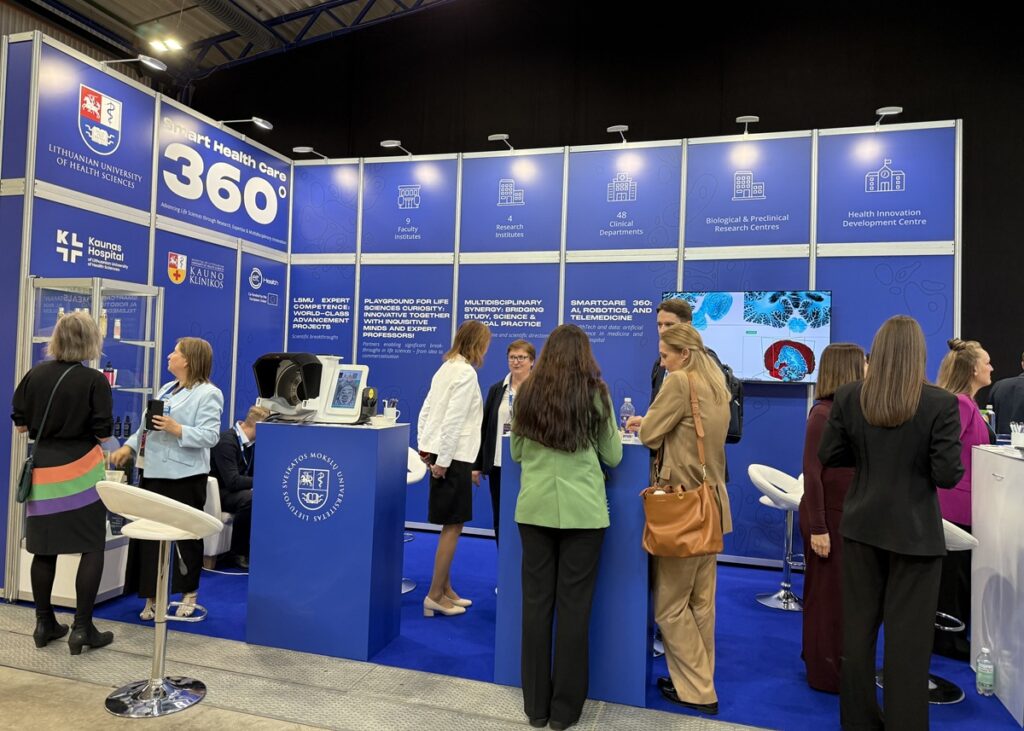
According to Prof. Habil. Dr Vaiva Lesauskaitė, Vice-Rector for Research at LSMU, the University stood out at the forum for the scope of its fundamental and applied research and its significant contribution to both national and international science and technology. The joint booth with Kauno Klinikos and LSMU Kaunas Hospital reflected the wide range of expert competences, as well as the unity of studies, research, and clinical practice.
Research into the microbiota, studies of microorganisms and viruses, pharmacogenomics – LSMU is developing high-quality science in many advanced areas: from artificial intelligence and big data analytics to nuclear medicine, which is one of the strongest fields in the Baltics,” said the LSMU Vice-Rector for Research speaking about the impressive scope of LSMU activities.
Life Sciences Baltics is an excellent platform for forging strategic partnerships and broadening expertise through numerous events. Over the two days, a large team of experts from LSMU, Kauno Klinikos and LSMU Kaunas Hospital actively participated in conferences, discussions, presentations of cutting-edge innovations and technologies, and various sessions.
The event generated interest, recognition, and new ideas for collaboration.
New Directions: Leaderships
Aistė Jekabsone, senior scientist at the Pharmaceutical Scientific Laboratory of the LSMU Institute of Pharmaceutical Technologies, underlined that many of the advanced applied research and technological fields pursued at LSMU can deliver tangible benefits not only nationally and regionally, but also globally.
She is engaged in the entirely new field of secretomics – a translational research and technology area combining cell therapy and traditional pharmacy. It is based on natural biological mechanisms used by cells to resolve disease-like processes in the human body.
“Cell therapy can be transformed into a dosed medicine and offered over the pharmacy counter, with the same effect as cell therapy administered in hospital. This is an important step for pharmacy, enabling a new paradigm in drug development. We can be proud to be among the world’s leaders in this field,” explained the researcher, who has founded a start-up to advance this health technology.
Life Sciences Discoveries for the Patient
Kauno Klinikos also took part in the forum with its team of specialists and researchers. At the region’s largest life sciences event, they presented the main research and innovation directions at Kauno Klinikos: personalised medicine, nuclear medicine and the unique cyclotron infrastructure in the Baltics, the expansion of the biobank and biomedical research, telemedicine solutions, and advances in the diagnosis and treatment of rare diseases.
Forum participants had the opportunity to learn how clinical practice, research and studies are integrated into modern healthcare at Kauno Klinikos.
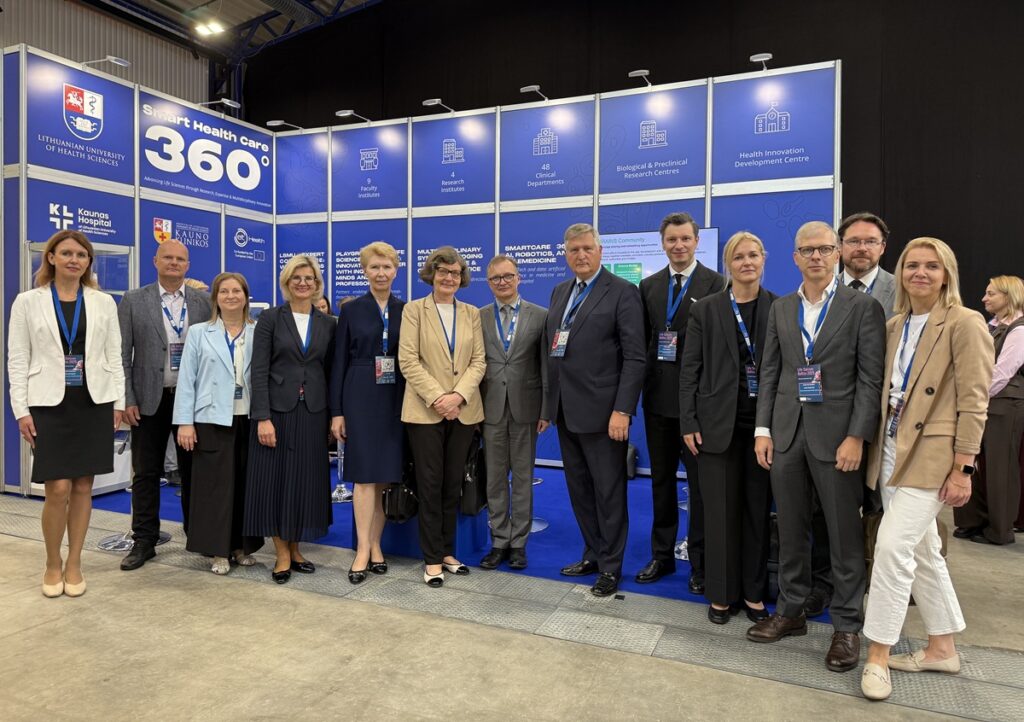
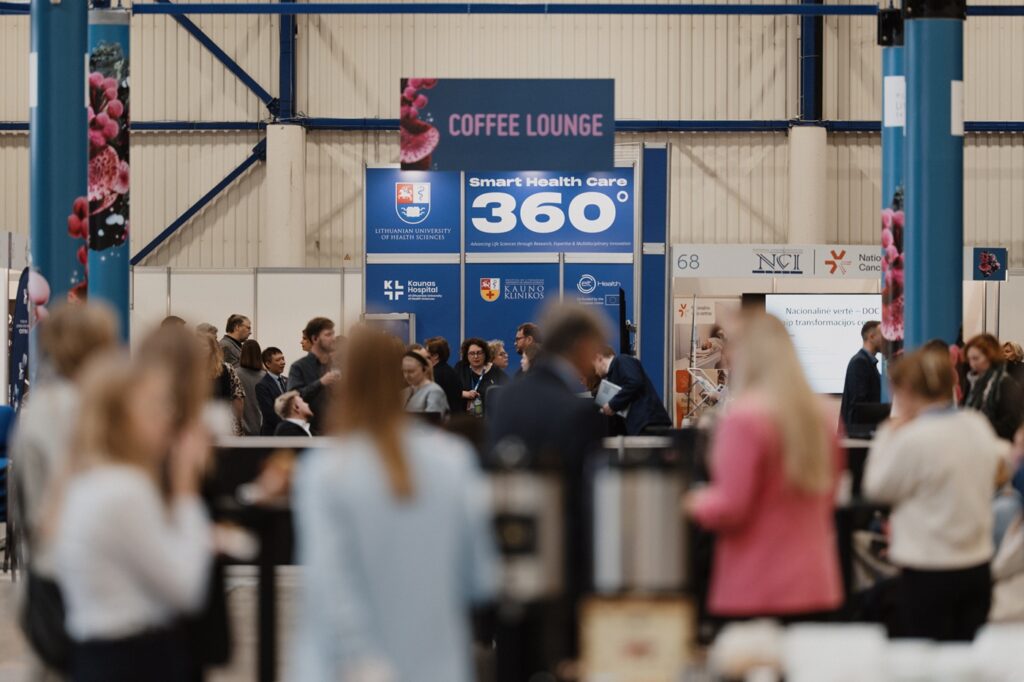
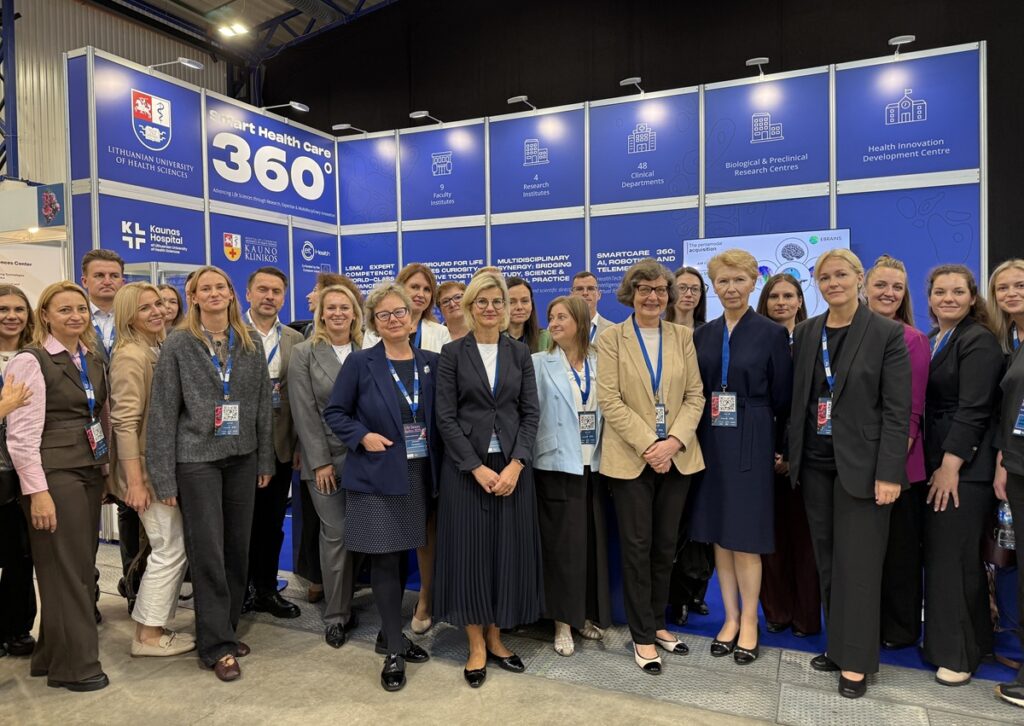
“We aim for life sciences discoveries to become clinical solutions that improve patient care. Participating in this forum was a chance to share experience and deepen dialogue with international partners, while jointly seeking new paths of progress in healthcare.
Nuclear medicine, rare disease diagnostics and treatment, the future of genetics, clinical trials and telemedicine are the areas we are systematically strengthening. Increasing attention is also being paid to data science, artificial intelligence and personalised medicine, which will form an important part of future healthcare and enable Kauno Klinikos to remain a leader in innovation,” said Prof. Habil. Dr Renaldas Jurkevičius, Director General of Kauno Klinikos, at the event.
Towards Personalised Medicine
Rūta Inčiūraitė, a researcher at the Clinical and Molecular Gastroenterology Laboratory of the LSMU Institute for Digestive Research, attended the forum to present the synergies between advanced organoid-based research methods and microbiome studies.
Currently, gut microbiome research is recognised worldwide as one of the most promising areas of applied biomedical research, reshaping modern disease diagnostics and treatment. LSMU researchers at the Institute for Digestive Research have received considerable international and national recognition in this field.
The aim is to apply these studies in personalised medicine. Organoids are used to study disease mechanisms and test various molecular and therapeutic substances. Researchers analyse gene expression regulation, organoid morphology, and whether certain substances stimulate cell proliferation. This contributes to the search for new disease management strategies. One of the goals is to develop organoids as a platform for testing personalised therapies for each patient.
The microbiome is explored for potential diagnostic markers that might enable early detection of disease. Research also examines how intestinal bacteria affect body cells and inflammatory processes. Microbiome studies are already being integrated into artificial intelligence tools for improved diagnostics and treatment.
“Out of billions of bacteria, we still know only a fraction of their true functions. By asking questions, seeking answers and improving technologies, we aim to maintain a solid scientific foundation,” emphasised the researcher.
From Research to Product
Throughout the two-day event, the joint booth of LSMU, Kauno Klinikos and Kaunas Hospital attracted many visitors interested in collaboration opportunities. The equipment for facial skin analysis was of particular interest. According to Professor Jurga Bernatonienė, Head of the Department of Drug Technology and Social Pharmacy at the Faculty of Pharmacy, numerous analyses with this device highlight the most common skin problems among patients.
New products are developed by summarising these data and making use of the equipment in the laboratories of the LSMU Centre for the Latest Pharmaceutical and Health Technologies.
Visitors and specialists at the Life Sciences Baltics 2025 also noted a new pharmaceutical innovation – face creams with active dermocapsules. The active substances are released only at the moment of use, when the dispenser cap is pressed. This technology reduces the need for preservatives, providing consumers with a healthier, as well as innovative, product.
Collaboration – the Key to Discoveries
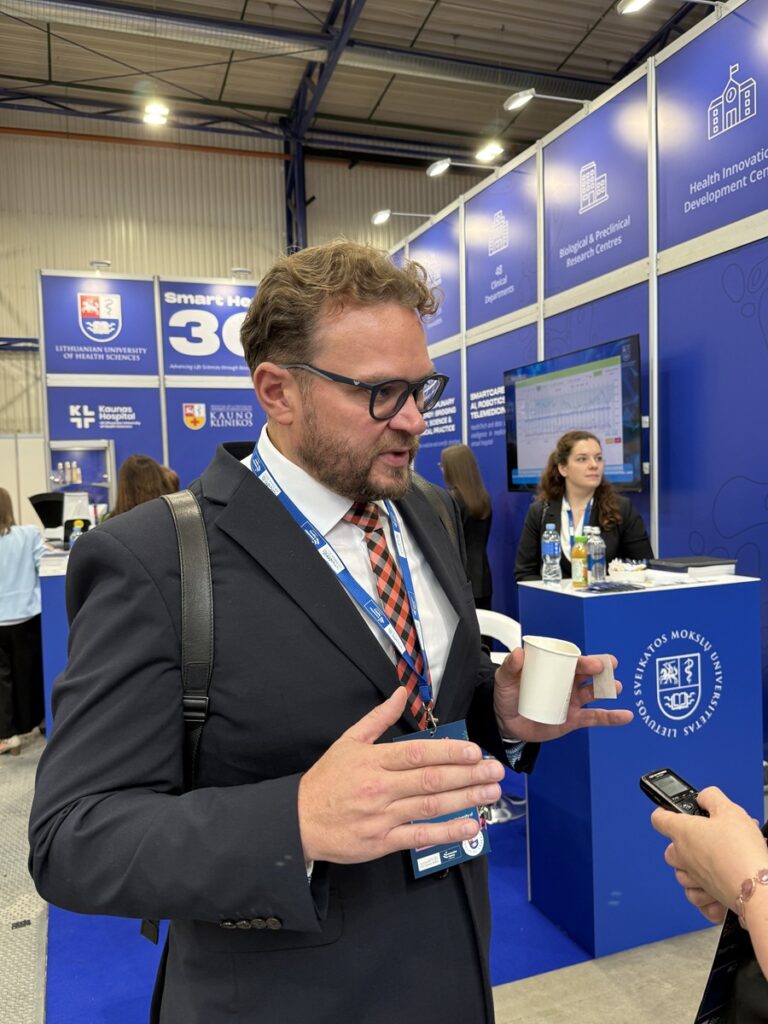
“We are unique at this event because of our nuclear medicine and negative ion cyclotron infrastructure, and the breakthrough we have made in diagnostics, treatment and research,” said Professor Donatas Vajauskas, Head of the Nuclear Medicine Research Centre.
The Professor emphasised the importance of broad collaboration between the University and its hospitals. Beyond clinical use, the cyclotron infrastructure is intended for the production of compounds essential for research in a wider sense.
“In many cases we are part of a larger multidisciplinary team, working with other research institutes. For example, we are collaborating with the Neuroscience Institute to develop preclinical research opportunities – using drugs in animal models to answer key scientific questions posed by the Institute’s researchers,” explained Professor Vajauskas.
The Life Science Baltics conference brings together the strongest and most innovative scientists and researchers in life sciences. This year, the theme that dominated a major part of the presentations was the application of AI methods to medicine. I am very pleased with the large, strong, innovative, and united LSMU team that participated at the conference,” Prof. Aušra Saudargienė, Head of the Laboratory of Biophysics and Bioinformatics of the Neuroscience Institute.
